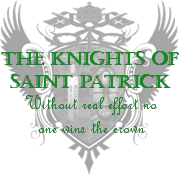There are three core tenets of Knighthood in the Knights of Saint Patrick. Prayer is the primary tenet for without prayer the other two will not happen, or at the least will not happen as they should.
Prayer is, at its very basic level, having a conversation with God. Sometimes, especially if you don't pray often, praying can seem like a one way conversation. It seems like the only one talking is you, and you can't tell if God is even listening or not. Sometimes this is how prayer is, sometimes it is us talking to God without God giving a reply. But, many times, God does speak to us during our prayers, through our prayers, or even right in our prayers. We have to have "ears to hear" and "eyes to see", as our Lord says.
Our ability to hear God speaking to us isn't something that comes natural in the modern world. We are used to the constant noise, the constant barrage of attention seeking advertising, the constant opportunity to keep our mind spinning on things that turn out to be unimportant in the grand scheme. Ultimately that is what we are after isn't it, knowing the grand scheme. God wants to let us in on it, or at least our part in it, but we have to learn to pay attention to him.
Working and Evangelizing come after Prayer in importance because you won't know what Works to perform and how you are called to Evangelize unless you are able to ask God and listen to God answer. Prayer is therefore our primary tenet.
How do we Pray?
Now that we know that praying is important, how do we pray?
Categories of Prayer
When we pray, our prayers will fall into one or more of the following categories.
Adoration
Showing adoration for God. Basking in his Love, or Goodness, or Truth, or Beauty. Contemplating Him. Telling Him how much we love Him and trust Him.
Contrition
Asking God for forgiveness and expressing sorrow for our sins. Acknowledging where and how we have damaged our relationship with God. Working on avoiding those same damages in the future. Talking to God about our sins.
Thanksgiving
Thanking God for all he has given us, for his many gifts. Being able to breath, and drink, and eat, to think rationally, to talk, to walk. All that we have and all that we are are gifts from God graced to us out of His Love.
Supplication
Bringing our needs to God. Asking for our daily bread and knocking at the door so that it should be opened to us. Putting our wants and needs at the feet of God and asking Him for what He wants us to have.
So those are the categories or types of prayer, but how does praying work in real time, when the rubber hits the road.
Forms of Prayer
Formulaic Prayer
Have you ever prayed the Our Father, a Hail Mary, maybe the Glory Be? What about the Hail Holy Queen, the Morning Offering, The Angelus, or Prayer to St. Michael? A Rosary perhaps, or Divine Mercy Chaplet, A Novena maybe, or even The Psalms, they might be scripture, but they are prayers too.
These all represent formal prayer or formulaic prayer. They are named, they have specific words, and they all express different aspects of our relationship with God and his creation. There are many many prayers out there and many different devotions. Each prayer will fall into one or more of the categories mentioned above. The Our Father or Lord's Prayer is a perfect example of a prayer that contains all four categories.
Build up your repertoire of formulaic prayers. They will serve you well in building your spiritual life and in defending it from attack. Memorize what you can and keep a prayer book or good set of applications on your phone handy. Whenever you find yourself with time, pray.
Spontaneous Prayer
Spontaneous prayers are prayers from the heart. They come as conversations with God and as direct expressions of one or more of the categories of prayer. Sometimes these prayers come upon us swiftly and we have to speak them out before we burst. Other times these kinds of prayers begin as conversations with God. "Hi God, I'm not doing so well today..."
Practice spontaneous prayer regularly and don't rely on formulaic prayer as your only weapon. Formula prayers are wonderful but you also need to develop a natural rapport with God. He is your Father, your Dad, your Abba, there is no need to always speak with Him in a formal manner.
Armament
Our Sword
A two sided broadsword. Etched on one side is the word Prayer. Etched on the other side is the word Fasting.
Our Shield
The Eucharist. The very flesh of God made manifest before us. The body, blood, soul, and divinity of God the Son, Jesus Christ, under the appearance of bread and wine.
Our Armor
Build your armor of prayers, starting with our shared prayer, the Breastplate of Saint Patrick.
